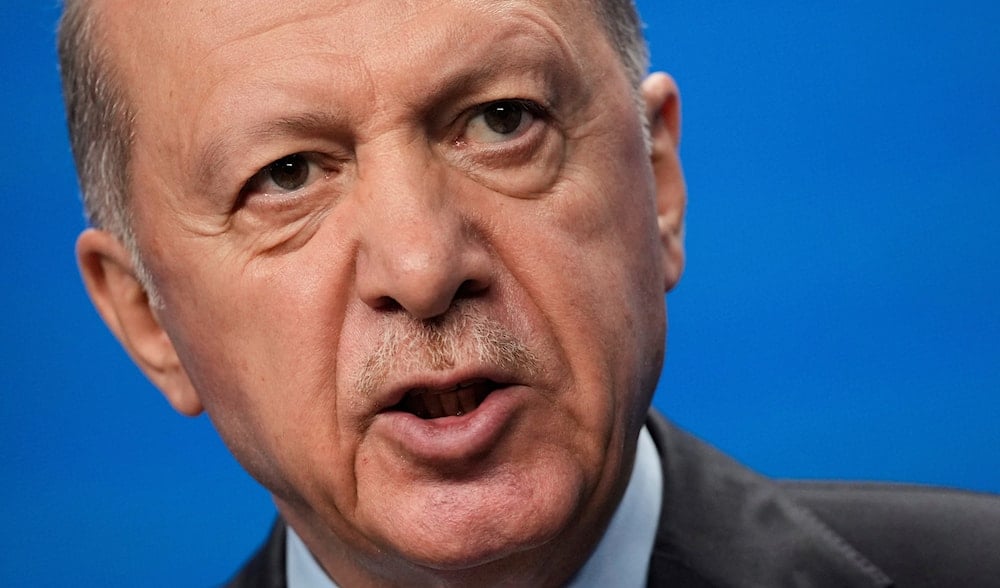Erdogan crackdown on Opposition intensifies: 500+ CHP figures detained
More than 500 members of Turkey’s opposition CHP, including 14 mayors, have been detained amid an ongoing probe that critics say is part of Erdogan’s broader crackdown on opposition and a threat to Turkish democracy.
-

Turkish President Recep Tayyip Erdogan speaks during a media conference at the NATO summit in The Hague, Netherlands, Wednesday, June 25, 2025 (AP)
Turkish President Recep Tayyip Erdogan has launched an extensive crackdown on his main political opponents, with more than 500 members and affiliates of the Republican People's Party (CHP) detained over the past nine months, a Reuters investigation has revealed.
Erdogan described the ongoing probe as an effort to dismantle a sprawling network of corruption, likening it to “an octopus whose arms stretch to other parts of Turkey and abroad.” However, critics say the operation reflects the deepening political repression aimed at dismantling the primary democratic alternative to Erdogan’s rule.
The investigation, which began in Istanbul, has expanded nationwide and focuses exclusively on municipalities governed by the CHP, the party founded by modern Turkey’s secularist leader, Mustafa Kemal Atatürk. The CHP has denied all corruption allegations, accusing the government of exploiting the judiciary to marginalize opposition voices.
Among those targeted are 14 elected mayors, including Istanbul Mayor Ekrem Imamoglu, widely seen as Erdogan’s leading political rival. More than 200 CHP members or local officials have been jailed pending trial. Analysts say such sweeping action has not been witnessed since the coups of the 1960s, 1970s, and 1980s.
Imamoglu at the center of corruption allegations
Imamoglu, who governs Istanbul’s 17 million residents and is viewed as a likely CHP presidential candidate, was detained in March on corruption charges. Despite his imprisonment, he continues to lead Erdogan in some public opinion polls.
Court documents show Imamoglu was questioned over alleged collusion with individuals who reportedly discussed bribes at a cafe near his home. His defense stated that the proximity explained why his phone connected to the same cellular tower as the suspects’.
Imamoglu’s lawyer, Mehmet Pehlivan, also jailed last month, argues the charges are politically motivated and lack any concrete evidence. Prosecutors have not issued indictments yet.
Legal process or political purge?
Former culture and tourism minister Ertugrul Gunay, who once served under Erdogan, said the investigation reflects the ruling party’s “anxiety and panic” ahead of future elections. “These investigations are being used as a tool for political attrition rather than objective examination of evidence,” he stated.
Erdogan and his ministers deny interfering with the judiciary, maintaining that the courts are independently evaluating the evidence. A spokesperson from the ruling AK Party (AKP) emphasized that criticism of the probe reflects internal turmoil within the CHP.
The probe has sparked mass protests, especially after Imamoglu's detention in March, and triggered a temporary sell-off of the lira. Despite growing concerns, Western governments have issued only muted responses, likely due to Turkey’s strategic role in the Middle East and Europe.
According to Reuters’ findings, at least 36 individuals from the private sector, many of them contractors, provided additional testimony under Turkish law’s “effective repentance” clause, leading to the release of 32 under judicial oversight.
The Directorate of Communications has rejected claims that the CHP is being exclusively targeted, noting previous convictions of former AKP mayors. However, none of the 14 Istanbul districts governed by the AKP have seen legal action in the current wave.
Implications for Turkey’s future elections
The investigation has now expanded to cities including Izmir, Antalya, Adana, and Adiyaman, all of which were captured by the CHP in last year’s municipal elections, marking the party’s largest electoral win in decades.
CHP Chairman Ozgur Ozel denounced the arrests as “a coup against Ataturk’s party” during a speech on Sunday. Authorities have since launched a separate probe into his remarks, citing potential charges of insulting the president.
Though the next presidential election is scheduled for 2028, speculation continues that Erdogan may push for an earlier vote or seek constitutional changes to extend his tenure. The CHP, meanwhile, faces an uphill battle as its mayors, many now imprisoned or suspended, await judicial outcomes on charges of corruption, bribery, and terrorism.
Read more: 'Never lose hope', Istanbul mayor tells supporters amid arrest

 4 Min Read
4 Min Read








